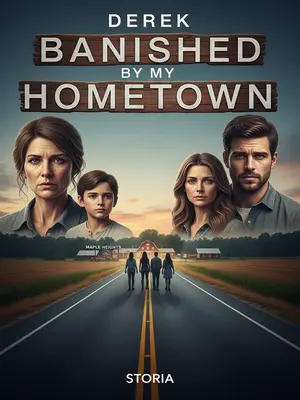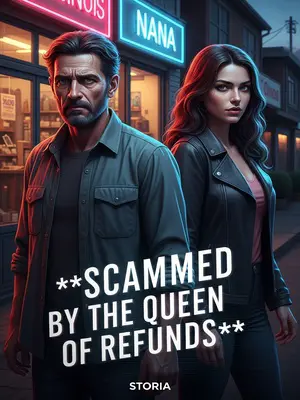Chapter 1: Betrayed by My Own Town
On the day I helped the entire town negotiate the redevelopment deal, out of nowhere, these floating comments popped up—like a live feed only I could see.
They flickered above people’s heads—bright, snarky, almost like some TikTok live gone haywire, but only I could see the stream. It was as if the universe had decided to throw shade. And in real time, no less—right when I thought I’d finally done something good for Maple Heights.
[Bro’s celebrating way too soon. The heroine already got receipts—he skimmed off the redevelopment money.]
[Right?? He coulda just ordered pizza for fifty bucks, but nah, had to blow a grand—straight outta the neighbors’ wallets. SMH.]
[Biggest joke? Richest dude in town offered $60/sq ft to buy us out, but he only got $50 for his own people. How much did he pocket? Zero conscience, man.]
[Heroine’s about to flip the script. Real estate mogul said if she gets him the land for $60/sq ft and dumps her fiancé, she can marry into his family. Love + $$$ = American dream, lol.]
[Neighbors already said: if she helps with the buyout, they’ll boot his bedridden mom just to get back at him. Savage.]
I let out a laugh, but I was more pissed than amused.
It was one of those dry, bitter laughs. The kind that escapes before you can swallow it back. My jaw tightened, heat crawling up my neck. Floating comments? Hell, if only my problems were just trolls on the internet.
My girlfriend always leaned on me, always expected me to support her whole family. And the neighbors—hell, they only got out of poverty because of me. Now they wanted to ditch our deal?
It was almost funny, if it hadn’t stung so damn bad. I’d been the guy patching roofs in the rain, fronting cash for groceries when paychecks ran dry. Now, the second someone else waved a bigger check, they were ready to throw me under the bus.
Fine. If they want to sell, let them handle it themselves.
Let’s see how far they get without me running interference with the city, or sweet-talking the bank when things got hairy. I’d always been the one juggling the paperwork, hustling for better rates, making sure folks didn’t get fleeced by some slick developer.
They had no clue I had the connections to turn this town into a tourist destination.
And not just any old tourist trap—real money, the kind that could change lives, not just slap a band-aid on potholes. I’d been working angles nobody else even noticed.
When that happened, the payout wouldn’t be $50 per square foot—it’d be $150!
That’s right—triple. The kind of payday that puts a town on the map, gets your kids through college, maybe even lets you retire before your back gives out.
If they’re gonna stab me in the back, I’ll help the next town over get rich.
Let Maple Heights stew in their own mess. Let them see what it’s like when someone else gets the break they could’ve had. Maybe then they’d realize what they’d thrown away.
When I first saw those floating comments, I figured they were just rumors.
Who believes stuff that pops up out of nowhere, anyway? I thought maybe I was just overtired, seeing things. But the words burned, stuck in my mind like splinters.
Our town used to be dirt poor, but ever since I came back, I kept leading the construction projects. Life was already getting better.
I remembered when the only jobs were hauling trash or pulling graveyard shifts at the mill. Folks had started to hope again—planting gardens, fixing up porches, talking about the future like it was something they could actually touch.
They were so grateful, always bringing over hotdish in casserole pans, jars of homemade pickles, or baskets of tomatoes every few days.
Mrs. Carter’s famous chicken pot pie, Mr. Jenkins’ home-canned green beans in Mason jars—sometimes I’d come home to a porch stacked with Tupperware and scrawled thank-you notes. For a while, it felt like we were all in it together.
Even this redevelopment—they’d asked me to handle it for them. Nobody twisted their arm. They came to me.
I didn’t push myself into the job. Folks voted at the VFW, patted me on the back, said I was the only one who could pull it off. I took that trust seriously. Maybe too seriously.
How could they possibly turn on me?
I kept running through the past year in my head, hunting for where it all went sideways. Had I missed some sign? Or did loyalty just not mean what I thought it did anymore?
Especially not Savannah Miller. My girlfriend. She’s the oldest of five girls—the baby’s just two months old. Their tuition, groceries, clothes, even her parents’ hospital bills—I paid for it all.
I’d been there for every scraped knee, every overdue utility bill, every late-night ER run. Savannah’s family became my family, or so I thought. I’d even started thinking about wedding venues and baby names. For crying out loud.
Would she really turn on me just because a few outsiders stirred the pot?
It didn’t add up. Savannah was stubborn, sure, but she wasn’t cruel. At least, I didn’t think she was.
But then my phone buzzed. It was Mr. Harris, the town council president.
His number flashed on my cracked screen. This was the guy who used to slip me butterscotch candies at town meetings.
"Ethan, where are you? Get over to the town hall, we need to talk."
His voice was clipped, all business—none of the usual small talk or weather chat. Something in my gut twisted.
Before I could answer, he hung up.
That was a first. Mr. Harris never hung up without at least a goodbye or a dad joke. The silence on the line felt like a slap. My stomach dropped.
His tone threw me. I tried calling Savannah, but she didn’t pick up.
Straight to voicemail. I tried again, but nothing. The knot in my stomach tightened, and I could feel a cold sweat starting at my temples.
I stubbed out my cigarette and drove my pickup to town hall.
The old Chevy rattled over potholes as I made the short drive down Main Street, passing the diner, the faded mural, the church sign that still read "God Bless America" in chipped paint.
As I pulled up, I saw a group of neighbors carrying rakes and shovels, heading inside.
It looked more like an angry mob than a town meeting. Even Mrs. Carter had her rolling pin tucked under her arm, eyes narrowed behind her bifocals. They looked like they were ready for a fight.
Just then, Mr. Harris called again, his voice impatient:
"You still not here? Move it! Everyone’s waiting on you!"
He sounded downright angry, like I’d just cost the town a winning lottery ticket. My hands tightened on the steering wheel for a second before I forced myself out of the truck.
Even if I’d been clueless, it was obvious this wasn’t going to be friendly.
The mood outside was thick, electric. Folks avoided my eyes, muttering under their breath. A couple of kids peeked out from behind their moms’ legs, sensing the tension.
I couldn’t help thinking of those floating comments. I walked in anyway.
The town hall smelled like old paper and burnt coffee, just like always. But the air felt heavy, like a thunderstorm about to break. I squared my shoulders and tried to look calm, even as my heart thudded in my chest.
As soon as I opened the door, the whole crowd turned to stare at me.
It was dead silent for a beat, every pair of eyes boring into me—accusing, expectant, some even a little scared. You could’ve heard a pin drop.
Mr. Harris elbowed his way to the front, sneering:
"Our town’s college boy finally shows up."
He used to say it with pride. Now, it dripped with sarcasm.
"So, how’d the redevelopment negotiation go?"
His tone was sharp, like he already knew the answer and was just waiting for me to trip over my own words.
I walked over and sat down at the main table, playing it cool:
"Didn’t I already explain everything? Why are we going over this again?"
I tried to keep my voice steady, but my palms were sweating. I met his gaze head-on, refusing to flinch.
Old Mr. Jenkins—everyone respected him—slammed his hand on the table. Glared at me.
The sound echoed through the hall. Jenkins was the kind of guy who still wore suspenders and polished his shoes every Sunday. If he was mad, you knew things were serious.
"So the payout is still $50 per square foot?"
He said it like he was reading my last rites.
"Is there a problem with that?"
I kept my tone even, but my heart was pounding. I could feel the weight of every stare in the room.
Here it comes.
The others started grumbling right away:
"Of course there is! If this place wasn’t worth something, why would that mogul want to build a senior center here? With land this good, why are we only getting $50 per square foot? You must’ve taken a cut!"
"We trusted you. You’re the only college grad around—smart and capable—so we let you handle everything. Never thought you’d stab us in the back!"
The words hit like a punch. These were the same people who’d toasted me at the Fourth of July cookout, who’d asked me to watch their kids and fix their fences. Now I was the villain in their story. Just like that.
I kept quiet, feeling more and more let down.
It was like the ground had shifted under my feet. I wanted to yell, to shake some sense into them, but all I could do was clench my jaw and stare at the table. Unbelievable.
The mogul wanting to build a senior center wasn’t a secret. But he had plenty of options—like the next town over, just a couple miles away. Their spot’s better, near the lake and the highway, and their roads are already paved. But they didn’t get the deal.
I’d spent months driving back and forth, talking up Maple Heights, promising things I barely believed myself.
Our town, stuck at the end of a dirt road, wasn’t even on the county’s redevelopment list.
Folks acted like we were some hot commodity, but the truth was, we’d been overlooked for years. Nobody cared about us until I forced them to pay attention.
It was me, spending my own money, making connections, smoothing things over, and finally landing the deal.
I’d put my own neck on the line, maxed out my credit cards, even skipped meals to make sure the paperwork was right. All for them.
But now, just because of some outsider gossip, they all turned on me—forgetting everything I’d done. Figures.
It was like I’d never mattered at all. Loyalty, trust—just words folks used until a bigger offer came along.
And my silence? They took it as guilt.
Every second I didn’t defend myself, their suspicions grew. I could see it in their eyes—judgment, disappointment, even a little fear. Great.
"See? It’s true! You did skim our money! Maybe you pocketed cash from the earlier jobs, too!"
"I heard someone offered $60 for the land! There’s 385 households in town. If you took $10 per square foot, how much is that? And you call yourself a college grad—you got no heart!"
"Why waste time? Make him pay it back!"
"Yeah, pay it back!"
A bunch of people started shouting for me to cough up the cash.
Their voices rose like a storm, drowning out reason. A few folks even started waving their shovels in the air, faces red with anger. Mob mentality.
"Ethan, sure, you helped us earn some money on those jobs before. But we were the ones working—you just sat around, eating and drinking, taking our hard-earned money! Why?"
"We worked with you for three years. You must’ve pocketed at least thirty grand! Ethan, you’re living off our sweat!"
Mr. Harris even spat in my face, riling everyone up to wave their shovels and demand I pay up.
The spit landed on my cheek, hot and humiliating. I wiped it away, jaw clenched so tight it hurt. The crowd was a pack now, hungry for blood.
Looking at their angry faces, I couldn’t help but sneer. Ha. Unbelievable.
I let out a short, cold laugh, the kind that says "you’ve got to be kidding me."
"Where’s your proof I took a cut? Show me the evidence."
"The mogul wanted to build a senior center, and the price was $50. Who offered $60? Did you see a contract? Did anyone sign it?"
"Didn’t I give you the town contract? It’s all there in black and white. Can’t you read, or do you just not care about the law?"
My words echoed in the hall, but nobody seemed to care about facts anymore. They wanted a villain, and I was the easiest target. That was me.
Zach Turner, who lives down the road from me, snorted.
Zach always was a skeptic, but now his smirk was downright mean.
"Just ‘cause there’s a contract doesn’t mean it’s real. Who knows if you faked it to scam us!"
Mr. Harris jumped in quick.
He was like a prosecutor now, banging his fist like a judge at a sentencing.
"Exactly! Stop with the paperwork! Today you gotta give back what you stole!"
"If you don’t, I’ll speak for the whole town and kick your family out!"
I almost laughed out loud.
The whole thing was so absurd, so backwards, I couldn’t help but let out a sharp, humorless chuckle. I shook my head, amazed at my own stupidity for thinking these people were my friends.
Laughing at myself for being such a sucker—still trying to reason with them, worried they’d get played.
All my late nights, all the stress, and for what? So they could turn on me the second someone whispered a lie? Typical.
These folks—the type to start griping before the dishes are even done—had already made up their minds.
It didn’t matter what I said now. They’d already decided I was guilty, and nothing would change their minds.
Maybe, just like those floating comments said, they wanted to chase a bigger payout with the mogul.
People always want more, even if it means burning down their own house to get it. I could see the greed in their eyes, the hope that maybe, just maybe, they’d hit the jackpot—like buying a lottery ticket or blowing rent money at a casino.
If they found a higher offer and wanted to switch, fine. But to slander me just to make themselves look good?
That was the part that hurt the most. Not the money, not the deal—but the betrayal, the way they twisted the knife and smiled while they did it.
I glanced around and saw more floating comments flash by.
They zipped through the air, mocking me. I wanted to swipe them away, but they just kept coming, relentless as the crowd. No escape.
[Move aside, the heroine’s here! The supporting guy’s lost everyone’s trust—perfect time for the heroine to take over.]
[Lol, dude was born to be her stepping stone. Doesn’t matter if he skimmed or not, he’s toast.]













